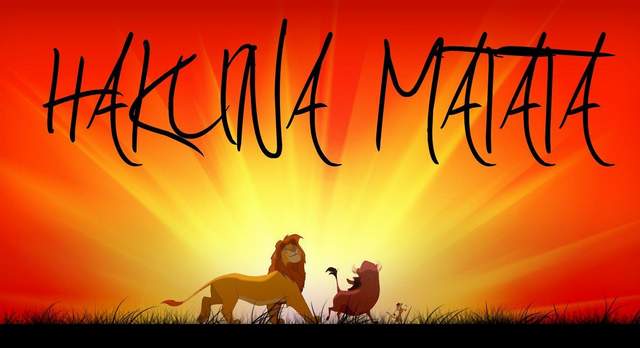Opinion/Editorial
HAKUNA MATATA
“There are no worries” is the rough translation from the African language of Swahili. And it is a huge lie. Without worries, we neither survive as individual humans in a savage world nor make it in functional social groups. Worry is the fundamental process, akin to fear, that lays at the foundation of all our thought processes. If a typical human was to come up with a list of top ten worries, and the top one of those resolved itself, then the human would merely move worry number two up to the top spot and make a new entry where the number ten was. “We have nothing to fear but fear itself,” was a uniting phrase of World War II, coined by Franklin Delano Roosevelt following Pearl Harbor. And it was and remains a huge lie.
Every single Marine who landed on Iwo Jima to take on the Japanese not only carried ashore (if he made it ashore) a healthy dose of fear but also vitally needed to carry that dose. Without fear we do not shy away from danger or go right at it, depending upon our rational process after analysis. Without fear and worry, no monthly bills would ever get paid. Without fear and worry, almost no one would maintain him or herself in a position of working for another human being at something our culture refers to as a job.
We need fear and worry. We thrive on them. Like lying. Without lying the truthful world remaining would be barren of all intellect. Without fear, worry, and lying our planet’s main life force would be vegetation. We are a world of things moving and things still. Animals move and plants don’t, for the most part. Animals are all divided into two divisions: prey and predators. A third division might be said to exist; predators who claim to be something else than what they are although they, in fact, are merely lying. The best liars are also among the best predators in every ‘moving’ species.
The number of things for a human to worry about, from birth to death, is mind-boggling. If we can imagine something we can worry about it, and humans have very fertile imaginations. We worry about the existence or non-existence of a caring God. We worry about asteroids coming to obliterate us, about aliens taking over the planet, about other countries developing weapons bigger and meaner than our own. We worry about other people taking our stuff or hurting us, and we put many other humans in prisons for long periods to make ourselves fear less, not because they necessarily did something so serious as to merit the incarceration (although some certainly deserve the sentence). We worry all the time that our own government is abusing us and going out of control. We have these giant worries, and then the more mundane ones. Do we have cancer? Is the headache a stroke? Will we get fired? Will our spouse or other family members like his or her birthday gift?
We worry to make things better and to create a life of ever more comfort in which our worries can be manageable enough for us to have long lives of relative bliss. And we’ve been immensely successful at accomplishing this in the more advanced Western cultures. The next time you indicate that someone else is a ‘worrywart,’ or that person appears paralyzed by fear, then understand why, and that you are most probably doing a better job of hiding your own worries and fears than that person at that moment. You certainly have them or you wouldn’t be here.
Hakuna Matata is fun to think about with a smile and the literary and cinema work that made it popular (The Lion King) is a great piece of entertainment. However, the only thing we truly must fear is having no fear at all. Without our fears, worries, and our wondrous ability to lie about every aspect of life, we would slowly retreat to the point of becoming meat for a more survivable predator. There’s a place in Africa that most people on the planet have never heard of. It’s called Burkina Faso. The capital of Burkina Faso is named Ouagadougou (pronounced as it’s spelled). That unknown city of 3.5 million inhabitants has thousands of taxi cabs that used to be painted with the art of Lion King. The author’s cab of the time had Hakuna Matata painted across its hood and side doors. No worries seemed to be as good a goal back then as it is today.







